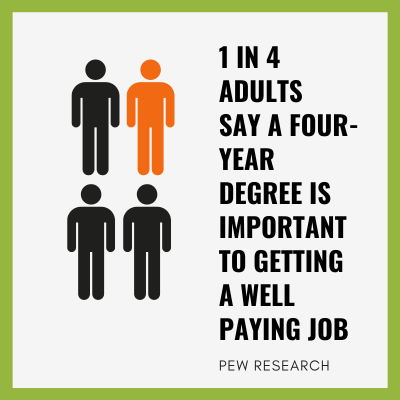Why should we care about microcredentials?
There are several reasons why stakeholders along the value chain should pay close attention to microcredentials.
It has been estimated that 50% of employees worldwide will need reskilling by 2025! And with the average tenure at a job landing at five years, the average employee will hold at least eight different roles over a 40 year career. It’s unlikely that a single degree will get that employee all the skills needed.
In that context, microcredentials become a means of creating efficient lifelong learning opportunities, making skills visible and portable, regardless of how they were earned.
Unless you are one of the lucky higher education institutions with a fat (or phat) endowment, any way of generating new revenue streams, and attract new customers, should be pursued.
Microcredentials: A new category of education is rising.
Alejandro Caballero, Sean Gallagher, Hanne Shapiro and Holly Zanville and published by University World News.
At the core of the traditional higher education system is a degree. However, over the past decade, enrolment in four-year degree programmes has steadily declined in the United States and, more recently, this trend has spilled over into emerging markets.
Administrators, policymakers and employers began to question if there was a better way to fulfil student and labour market needs.
Meanwhile, a new category of structured education was on the rise, offering smaller learning units with the potential of achieving a faster return on investment. As the pandemic took hold, interest in new learning models and digital offerings boomed.
A globally accepted definition doesn’t exist yet for these smaller learning units but microcredentials – also often referred to as alternative or non-degree credentials – are emerging as a term to describe education that falls between courses and degrees. Microcredentials include certificates, digital badges, licences and apprenticeships, the latter equating to full qualifications in Europe.
What is driving microcredentials?
There are several primary drivers of non-degree credentials. First, according to the World Economic Forum (WEF), the gap is widening between the type of education offered in traditional higher education institutions and the skills needed to work in today’s digital world.
Second, the lack of equal access to education has highlighted a need for solutions that provide the skills that lead to work, particularly for marginalised populations.
Third, a significant number of people around the world have obtained some higher education credits, but have not earned a formal degree. Fifty percent of students in the US either stop or drop out of public higher education institutions, both community colleges and universities, before they complete a degree.
Leave rates have also grown during the pandemic in emerging markets, forcing institutions to develop strategies to improve student success and retention and recruit adults in some college populations to return to complete credentials.
Strong partnerships fuel innovation
Private, third-party suppliers are partnering with leading universities and larger companies to offer massive online open courses, or MOOCs, a model for delivering content over the internet with few limits on the number of attendees, to combat inequities and boost skills.
For instance, edX and Coursera each offer thousands of free online courses and paid certificates to students looking to demonstrate proficiency in a subject or interested in starting, switching or advancing their careers.
Other models based on public-private partnerships are evolving within the European Union, with European University alliances and the European Institute of Technology driving joint development of training offerings.
While growth of the traditional higher education market has slowed in the US, except for high-demand programmes like nursing, MOOC providers are experiencing double-digit growth rates.
Research has shown that approximately 40% of American adults in the US have some type of alternative credential, which could be a standalone certificate, industry certification or licence complementary to a traditional degree. Data about developing countries and from Europe are not yet available.
Employer responses to microcredentials
We have reached a tipping point with the acceptance of online learning. In 2013, about 40% of US companies accepted online learning when evaluating job candidates. In a 2021 national survey, 71% of employers responded that online credentials were equal to or better than those earned through traditional means.
However, the broader adoption of microcredentials hinges on developing greater employer awareness and experience with these offerings.
More forward-looking companies are focused on building versus buying talent in today’s job market. Human resources leaders see the value in investing in employees rather than recruiting and onboarding new ones.
The cost of non-degree credentials to boost employee skills is typically less than in traditional programmes. Some larger corporations like Google and IBM are issuing their non-degree credentials to their employees and the public. Other examples include initiatives such as the European Automotive Skills Alliance with a comprehensive offer of industry credentials in response to a green economy.
Click to read the full article.
Or if you are ready to learn more about Jobspeaker, schedule a demo today.


